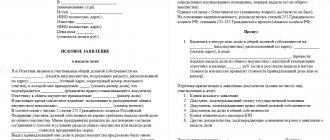With the help of a document such as an agreement on the allocation of a share in property rights, it is possible to achieve a real division of property. This article will focus on property that is in shared ownership (basis - Article 252 of the Civil Code of the Russian Federation): when the shares in the right to it have already been determined - when purchasing housing, land and other objects (specified in the purchase and sale agreement ), donation (in the relevant agreement), as well as in the agreement on determining shares in common property.
The most important thing in preparing for the allocation of a share in property rights and the signing of an agreement is to reach an agreement between the participants. About how to actually allocate a part of the property that corresponds to the size of the share. The nuances of the agreement and methods for allocating a share in property rights will be discussed below; details can be clarified with the duty lawyer.
:
Agreement on the allocation of a share in property rights
What do you mean by part?
Shared ownership of non-residential premises is generally considered to be a form of ownership and management of a real estate fund in which such property will have two (or more) actual owners who have equal rights to each other regarding a specific property.
This form of ownership can arise for various reasons, which must be reflected when drawing up the appropriate documents confirming existing property rights.
The most common reason for the emergence of shared ownership, regardless of which premises it is registered for, will be considered:
- making a joint purchase by several future co-owners of real estate with the payment of a proportionate payment for the purpose of subsequent allocation of shares for ownership and disposal;
- privatization of a previously unregistered state or municipal property belonging to the residential or non-residential real estate fund;
- receiving shares in real estate in accordance with the will specified in the will after the death of the testator.
Much less common is the basis for the emergence of shared ownership as the sale by the owner of the entire premises of some part of it to another owner.
Most often, this form of shared ownership occurs when forming a list of owners of non-residential premises located in various shopping or office centers, when the owner of the building sells parts of it (offices, offices, space for boutiques) to interested parties.
In connection with such possibilities for the emergence of shared ownership, the mode of use of property in such ownership must be determined in such a manner that none of the co-owners will limit the rights of other similar persons.
State duty
The amount of the state duty depends on the price of the claim and is calculated according to the rules of Art. 333.19 Tax Code of the Russian Federation. Using the table, you can do the calculation yourself.
Example: A claim for the allocation of a share from a house worth 2.5 million rubles.
The state duty is calculated as follows:
13,200 rub. (fixed payment) + 7,500 rubles (0.5 of the amount more than 1 million rubles).
The total amount of state duty on the claim will be 20,700 rubles
How is the regime for the use of property established?
Speaking about the regime for the use of shared non-residential property, it should be noted that such a regime will be established by a joint use agreement.
One of the conditions of such an agreement should be a mandatory indication that such use should not limit the rights of ownership and use of the remaining shares available in a particular non-residential premises.
Another feature of the use of non-residential real estate that is in shared ownership should be considered that the existing common property (for example, warehouses, corridors, stairs, etc.) must also be used by all co-owners, and the restrictions created (for example, owners larger shares for some reason limit the rights of owners of smaller shares in the possibilities of using stairs) will be considered illegal.
To more carefully regulate the establishment of the regime for the use of real estate non-residential property used in the mode of shared ownership, it is necessary to take into account the provisions of Article 247 of the Civil Code of the Russian Federation.
This article states that each owner of a share in the premises (regardless of whether it belongs to the residential or non-residential stock) has the right to demand that such part of the existing real estate be provided to him for ownership and use, which will be commensurate with the share determined by the existing property. his right of ownership.
Share allocation
The allocation of a share of property in kind can be resorted to if, for some reason, it is not possible to establish a full regime for the use of the existing non-residential premises (for example, due to the emergence of insurmountable disagreements between the co-owners of such premises).
In this case, the co-owner whose property rights have been limited or infringed, in his opinion, has the right to apply to the court with a corresponding statement of claim. However, it should be understood that such allocation cannot be made in all cases.
When allocating a share in kind, the use of non-residential premises in the mode of joint ownership and use is terminated.
As soon as the share has been allocated in kind, it is necessary to register ownership of part of the non-residential premises and obtain all relevant title documents.
The allocation of a share in kind cannot be carried out in the following cases:
- allocation of a share is unrealistic due to the architectural features of the property in question;
- the size of the share in the common property is insignificant;
- the owner of the allocated share has no interest in the property being used jointly.
In all other cases, if such an event does not interfere with the full use of non-residential premises by other co-owners, the allocation of a share will be possible, but only if an appropriate court decision is made.
How is the part selected?
Here we will tell you about the procedure for using non-residential real estate.
The allocation of a part of non-residential premises for natural possession is carried out by issuing an appropriate court decision. In order for the decision to be legal, all actions must be carried out in several stages:
- At the first stage, which will be directly filing a statement of claim in court, it is necessary to draw up this statement. The text of the document must contain information about which premises are subject to division, highlighting its natural part (including information about the cadastral number of such premises, the presence of owners and third parties interested in the operation of this premises).
In addition, the application must contain information about the basis for the applicant’s property claims (for example, that part of the premises that he wants to take into independent ownership was inherited in the form of a share), as well as information about whether there have been previous attempts to resolve the arising conflict by any means other than judicial.Statement of claim for allocation of shares
- At the second stage, the actual consideration of the statement of claim regarding property claims occurs (since the allocation of a share in natural ownership is precisely a property dispute).
At this stage, the court examines all submitted documents and other evidence that can confirm the legality of the demands put forward and the absence of other possibilities for resolving the existing dispute.Evidence at this stage can include not only existing documents (for example, confirming the fact of shared ownership of a specific property), but also testimony (which, for example, can confirm the fact that the other owners of this premises are preventing the plaintiff from using his part of the premises in accordance with his purposes).
- The third independent stage in registering part of a non-residential premises as natural possession will be the court making a decision on the case and receiving this decision by all interested parties to the case. Such a decision comes into force ten days after it is made, unless it has been appealed by one of the parties participating in the process.
- The fourth stage occurs only if the court has made a positive decision in favor of the plaintiff and satisfied his demands for the allocation of part of the premises into natural possession.
At this stage, the plaintiff, having received his copy of the court decision that has entered into force, with this document, applies to the territorial divisions of Rosreestr, to which the specific property belongs by location, to obtain a certificate of ownership of his part of the non-residential premises.Within no more than ten days from the date of submission of the application, a title document will be issued.
In order for the resulting property dispute to be resolved with the least financial and moral costs for the plaintiff, he will need to prepare all the documents that may be needed and go to court.
Consideration of property disputes can take place in courts of two levels - justices of the peace (if the value of the claim, that is, the value of the property claims in this claim, does not exceed fifty thousand rubles) or courts of general jurisdiction (if the value of the claim is higher than fifty thousand rubles).
That is, in the vast majority of cases, cases of this nature will be considered in courts of general jurisdiction. When filing a claim, a state fee for consideration of the case must be paid.
For property disputes, it is calculated based on the value of the claim, regardless of who files it - an individual or a legal entity.
In order to determine the exact amount that will need to be paid, on the website of the court to which the appeal will be made, you can use the state duty calculator (with the choice of the value of the claim “filing a claim of a property nature subject to assessment”).
After entering the claim amount, the calculator will generate the value that will need to be paid.
For obtaining a certificate of ownership, the state fee is standard and amounts to two thousand rubles for individuals, and twenty-two for legal entities.
It is much easier to allocate a share in its natural form if a share participation agreement was previously concluded.
List of documents attached to the statement of claim
Each case is individual, therefore, in addition to the documents presented below, the court may request any additional documents if they may influence the court's decision.
Sample list of documents:
- passports of the plaintiff and defendant - copies;
- three copies of the statement of claim;
- title documents for property;
- technical certificate;
- cadastral passport (for a land plot);
- construction and technical expertise;
- real estate valuation agreement;
- receipt for payment of state duty - original.
What is a contract (agreement) and when is it necessary?
An equity participation agreement is considered to be an agreement concluded, which is signed by the future co-owners of non-residential premises at the stage of its construction.
This is the most common equity participation agreement, the main condition of which will be co-financing of the construction of such premises.
The conclusion of such an agreement is carried out in cases where the premises are not being built on their own (for example, the future co-owners independently hired a construction organization that will carry out the construction of an office center according to a previously developed project), and the future co-owners contribute money to obtain a guarantee of ownership of a specific premises after the building is handed over to the acceptance committee.
Moreover, when concluding such an agreement, the co-owners may not even know about each other’s existence, since the parties to such an agreement will be the person who contributes funds and subsequently acts as the acquirer of a certain area (or premises) in such a house, and the developer himself , benefiting from the sale of the areas he builds.
In rare cases, a share participation agreement is concluded between the owners of shares in a specific non-residential premises, if such premises will be reconstructed or rebuilt.
However, this type of agreement is still one of the subtypes of classic share participation agreements, according to which each acquirer of a share contributes the amount of funds that corresponds to the size of the share he is acquiring.
Agreement for participation in shared construction of non-residential premises
Legal consultation
If you need qualified legal assistance on this issue, our lawyers are absolutely free. Competent specialists will give competent advice on preparing a statement of claim or, if required, provide the necessary services.
Ask a free question and get expert support!
(C) Liliya Dorofeeva, practicing lawyer. Especially for VSude.INFO
Did not find an answer to your question? Ask it to a lawyer by phone!
. Moscow: +7 (499) 755-83-41
St. Petersburg: +7 (812) 917-23-31
- About
- Latest Posts
Consultant VSude.INFO
Legal consultant of the site VSude.INFO Ask your questions in the comments or in the feedback form. Verification and response time is from 24 to 48 hours.










